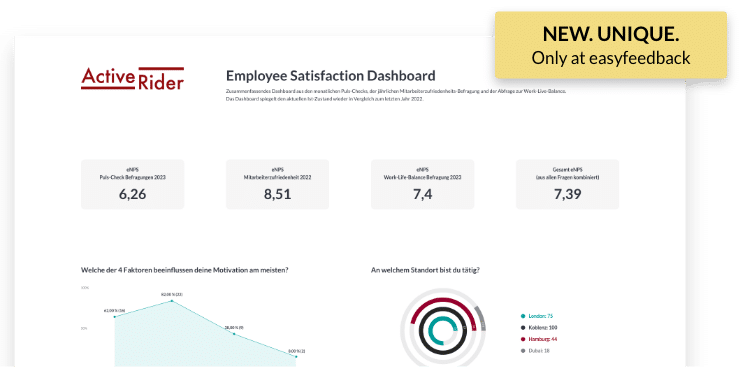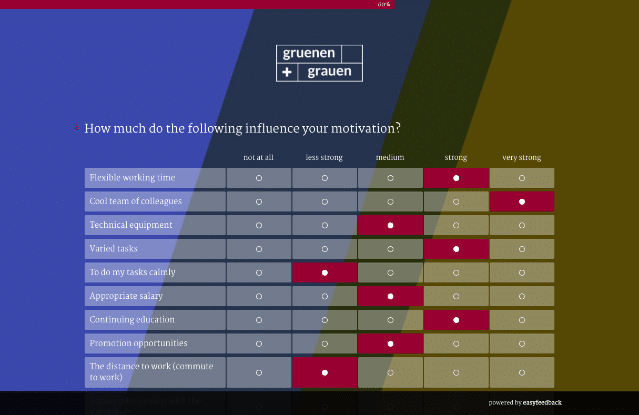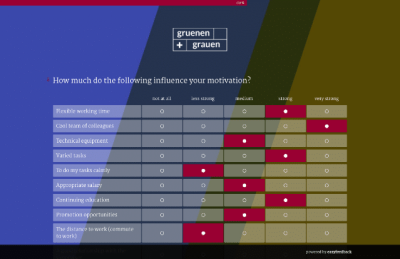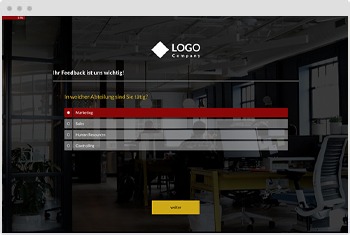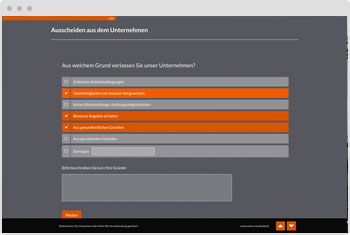Employee motivation - find out what motivates your employees

Learn what motivates your employees and where you can apply levers to strengthen employee motivation
Content & goals of this employee motivation survey template
Motivated employees make a significant contribution to your company’s success. But what happens when employees are not motivated? First, work performance usually drops; work is still done, but outstanding performance is no longer expected. In addition, demotivation often spreads to other employees, resulting in absences due to illness and even dismissal.
Resignations result from employee dissatisfaction. This leads to disruptions in processes for the company and thus to higher costs due to the hiring process to replace the employee.
But this does not have to be the case! Find out early on what the current mood of your employees is and what motivates your employees to do your job with our survey template. This will help you better understand your staff and derive appropriate actions.
This will prevent turnover within your company, improve employee motivation and retain talent.


Content:
• Recognizing the current state
• Find out what really motivates your staff members
• Measuring employee motivation
• Finding opportunities for improvement
• Identification with the employer
Goals:
• Improve staff motivation
• Intensify employee loyalty
• Perceive employee wishes and needs
• Reduce fluctuation
• Avoid disruption of processes
• Reduce costs
• More stability in the company
Almost everything you need to know about employee motivation
1. What does employee motivation mean?
By motivation we mean a state that causes a person to choose an alternative course of action in a given situation in order to achieve a specific event.
Employee motivation is a specific subgroup that focuses specifically on the motivation of employees. Here, the questions are: What motivates workers to get up in the morning and go to work? And what motivates you to get the job done? Do you do it fully motivated or half-heartedly because you lack something?
Incentives play an important role in motivation. If these are missing or if they are not attractive to the respective employee, motivation decreases. What exactly motivates an associate can vary from employee to employee. One person may be motivated by career opportunities, another by a good work-life balance.
2. Why is employee motivation so important? What impact does it have?
Employee motivation has a great impact on the success of a company. A motivated employee performs his work reliably, he stands behind the goals of his employer, thinks innovatively and enjoys coming to work. Unmotivated employees, on the other hand, are less likely to work, are more likely to be ill and can even create a bad atmosphere in the company.
Moreover, an unmotivated worker will leave the company sooner or later. This results in a disruption of processes, enormous costs and stress for the new employee search and training.
It is therefore worthwhile to find out in good time what motivates employees and whether these aspects are already being met. If not, there is still time to intervene and create attractive incentives for employees.
In the long term, this will reduce fluctuation within your company and save you time and money on finding and training new employees. Your employees will approach their work with greater satisfaction, identify more strongly with the company and be more productive at work. This, in turn, benefits the company.
3. What factors influence employee motivation?
The motivation to perform a job ultimately varies from employee to employee. A young professional has very different expectations of his employer than a mother of two. Nevertheless, there are a few general factors that we have compiled for you below:
Salary
Even though money is usually not the number one motivator, it still plays a major role. Is the salary commensurate with the job or is it a back-breaking job with miserable pay? Is the salary enough to live well on? Is there money left at the end of the month for a vacation, special expenses, or to save, or does it just cover the cost of living? The best job can be demotivating if the salary is not enough to live on.
Opportunities for advancement
For young people in particular, the opportunity to develop within the company, to take on more responsibility or to climb the career ladder is a desirable goal. If this opportunity is missing, it can lead to demotivation and frustration. People who lack perspective are more likely to reorient themselves.
Supervisor
A good supervisor recognizes the talents of his employees, encourages them and uses them according to their strengths. A boss who listens to his employees and advocates them makes a significant contribution to employee motivation. Even sincere praise from a supervisor can quickly increase an employee’s motivation. On the other hand, a bad relationship with the supervisor can put a lot of strain on the employee. If the boss is never accessible to his staff members or if he exerts strong pressure on his employees as part of his position of power, this will quickly demotivate the employees.
Workday
What does a normal working day look like for you? The piles of files are so high that you can’t see your counterpart, the phone rings in a tour, the tasks are not feasible because important informations are missing? Sounds like a nightmare? But this is part of the normal working day in many companies. Stress and excessive demands are one of the main reasons for demotivation at work. In contrast, a well-structured workday with a fair distribution of tasks and the philosophy: “We can do it together!” can do a lot to increase motivation.
Work-life balance
While it may be okay for the young professional to work overtime until late at night every day, it is usually not reasonable for a mother. A balance to the workday is important to regain energy for the next day. If private life suffers as a result of work, this quickly leads to dissatisfaction. Flexible working hours and overtime compensation can help here.
Identification with the company/goals
Identification with the company also plays a major role in motivation. If the employee can identify with the company’s goals and if these also have a high priority for him, he is more motivated to contribute to achieving these goals. This positive aspect is often found in the social area.
4. How can you measure employee motivation?
The best and easiest way to measure employee motivation is with a survey.
Using a questionnaire adapted to your company, you have the opportunity to ask your employees questions about their identification with your company, the motivation of your employees or other important areas.
We have summarized the best questions in point 6.
5. How can you increase employee motivation?
The young professional may be motivated by further training and career opportunities. For the mother of two kids is a good work-life balance through flexible working hours important. For example, a secure job with a good working atmosphere is important to the long-serving employee who is about to retire. The reasons for motivation differ according to age, the stage of life the employee is currently in, and also the character of the respective worker.
Since the respective reasons for motivation are as different as the people themselves, it is good if you first find out what motivates your employees and what they want. Of course, this works particularly well in a one-on-one conversation. In large companies, however, this is often not feasible with every worker, so employee surveys are a good alternative.
With a survey, you can find out whether your staff is behind your company, what motivates them and whether these areas are already being implemented. If not, you now have the opportunity to adjust this accordingly.
In general, create a positive work environment for your staff members. Be responsive to employees’ wishes, praise good performance. Ensure a fair distribution of work and offer incentives. You can also increase motivation by communicating the company’s goals and making it clear to your employees that their work management contributes to achieving these goals.
6. What questions can I ask in an employee motivation questionnaire?
We have compiled a few possible questions for your survey below:
- Would you recommend your employer to others?
- What thoughts do you have when you think about work?
- How is the cooperation with your supervisor?
- Do you trust management’s implementation plans?
- Do you stand behind management’s decisions?
- What motivates you in your job?
- Which of the following demotivates you about your job?
- Can you imagine still working for your employer in five years?
For more suggestions, feel free to take a look at our employee motivation survey template or simply create a survey yourself using easyfeedback.

“Identifying customer needs is an essential part of our business. easyfeedback accompanies us for many years as a loyal partner in this task. We particularly appreciate the intuitive usability of the survey tool as well as the professional support.”
Guild Lead User Experience Research

“We use easyfeedback for internal and external surveys – fast, comfortable and really easy! Straightforward and cordial support can always create a smile. We really appreciate the permanent development of the platform.”
Guest & Competitor Insights Analyst







Every month more than 740,000 feedbacks are collected via easyfeedback
